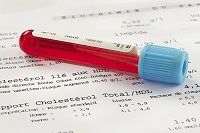Evolocumab Phase 3 Trials Show Efficacy in Lowering Cholesterol
For patients with heterozygous familial hypercholesterolemia, statin therapy is often not enough to reduce LDL cholesterol. In two articles in The Lancet, researchers report on promising results of two international Phase 3 trials of evolocumab. The drug is a monoclonal antibody to proprotein convertase sudbtilism/kexin type 9 (PCSK9).

For patients with heterozygous familial hypercholesterolemia, statin therapy is often not enough to reduce LDL cholesterol. In two articles in The Lancet, researchers report on promising results of two international Phase 3 trials of evolocumab.
The drug is a monoclonal antibody to proprotein convertase sudbtilism/kexin type 9 (PCSK9).
In the larger of the two studies, known as RUTHERFORD-2, Frederick Raal, PhD and colleagues reported on the experience of 331 patients at 39 sites in Australia, Asia, Europe, New Zealand, North America, and South Africa from February 2013 to December 2013.
The subjects either received 140 mg of evolucumab in subcutaneous injections every 2 weeks or monthly or a placebo. Those getting the drug showed a 60.2% to 65.6% reduction in LDL cholesterol by the last two weeks of the trial.
The researchers said the drug was well tolerated.
In the smaller study Raal and colleagues reported on results at 17 sites in 10 countries in North America, Europe, the Middle East and South Africa. The study, known at TESLA Part B, involved 49 patients, of whom 33 got the drug and the others got a placebo.,The dosage was 420 mg administered every 4 weeks over a 12-week period. “Compared with placebo evolocumab reduced LDL cholesterol by 30.9%,” Raal wrote.
The drug was well tolerated with no serious adverse events. The researchers found no signs that patients had developed anti-evolocumab antibodies during the time they got the drug.
Homozygous familial hypercholesterolemia is a rare, serious disorder caused by very low or absent plasma clearance of LDL, substantially raised LDL cholesterol, accompanied by development of cardiovascular disease. Globally it occurs in about 1 of 500 people.
Both trials are registered at Clinical Trials. Gov. The TESLA Part B study is NCT01588496 and the RUTHERFORD-2 study is NCT01763918.
The research was funded by Amgen.